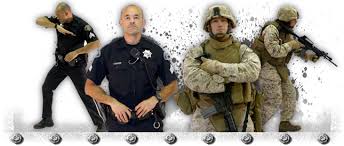
Police, Military: Different Roles, Different Goals
By William F. Jasper
In his essay above, Major General McGregor notes, “Using the military to police the citizenry was anathema to our Founders,” and further reminds us that this misuse of military power is “one of history’s tragic paths to tyranny and oppression.”
One of history’s most famous examples of this path to tyranny is Julius Caesar’s crossing of the Rubicon River at the head of his legion. In bringing his army into Rome, he knowingly violated the explicit orders of the Roman Senate as well as the sacred tradition of the Roman Republic. It was an act of treason and a declaration of war against the republic. Civil war soon followed. So began the reign of the Caesars and the transition from republic to empire.
Our Founding Fathers were mindful of this example and many others from history’s dustbin of lost freedoms. They recognized that military force is necessary to protect the nation both from invasion from without and insurrection from within. However, they also struggled with the perennial conundrum of how to prevent politicians and generals from using the military to establish dictatorship. The checks and balances they established in our constitutional system strictly limit the federal government’s use of the military, with the unorganized militias (the armed citizenry) and the organized state militias serving as counterposing forces to the national military.
The Founders also recognized the fundamental distinction between a military force and a police force. Members of the military are “warriors”; it is their job to fight our wars. Members of police and sheriff’s departments are “peace officers”; it is their job “to protect and to serve,” to keep the peace and enforce the laws. The mission of the military is to repel, kill, or capture the enemy; destroy enemy capabilities; and capture and occupy enemy territory. The military services — by nature of their mission, training, and national command structure — cannot appropriately serve the function of local law enforcement. They would be an occupying army, as foreign to our nature as would be an invading foreign army, and unaccountable to local control.
The National Guard are often called up by governors for emergencies — such as hurricanes, tornadoes, earthquakes, floods, blizzards, and riots — but their service is temporary, and not a replacement for local law enforcement. That is why the Biden administration’s push to nationalize Guard units is particularly alarming.
Recognizing the perennial danger of usurpation, the Founders wisely reserved police powers to “the States … or to the people.” Although the federal government, over the past several decades, has been usurping more and more control over local police, we are still blessed to have in these United States a system of local control over our police and sheriffs. If and when genuine cases of police brutality or excessive force do occur, legitimate means already exist at the state and local levels for corrective action. These include the police commander, police chief, police commissioner, internal affairs office, city council, mayor, county supervisors, city attorney, district attorney, grand jury, and state attorney general. And if laws need to be changed in this regard, local officials and state legislators — not politicians in Washington, D.C. — are the appropriate authorities to address the matter.
See related article: https://thenewamerican.com/what-the-founders-feared/
Published with Permission of thenewamerican.com